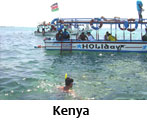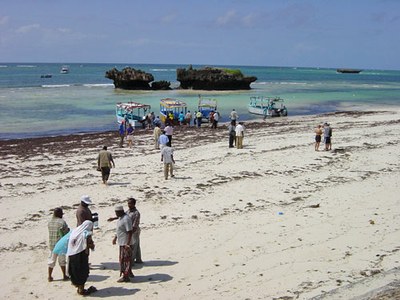Kenya
In Kenya, tourism has been steadily growing both in terms of numbers and revenue generated since independence and it continues to be one of the most important economic sectors in the country. Tourism contributes 12.5% of the GDP to the country in 2011, the total earnings from this sector was 97.9 Billion shillings (Kenya National Bureau of Statistics Economic Survey 2012). The COAST Project demonstration project is called; Integrated Planning and Management of Sustainable Tourism at the Coastal Area of Watamu, and aims to, promote best practices in mitigating environmental impacts of tourism and conserve globally significant biodiversity through; the introduction of environmental management systems, strengthening eco-tourism, and improved reef recreation management.
Kenya Demonstration Project: Integrated Sustainable Tourism Planning and Management at Watamu on the Kenya Coast

Tourism contributes 12.5% of the GDP to the country, of which, coastal tourism accounts for 60%. Even though safari tourism has been for years the main tourist product for East Africa, the coastal region is currently the main tourist destination for both national and international tourists (visitors). Immediately after independence, tourism was the fastest growing sector of the Kenyan economy. Only coffee and tea production brought in more foreign exchange. Income from tourism first exceeded that from coffee in 1989. Between 1990 and 1993, 3.23 million foreign visitors came to Kenya, representing about 5% of the tourist trade in Africa and about 28% of that of Eastern Africa. However, besides the positive gains from tourism, the sector also impacts negatively on the coastal and marine environment. The first hotels in the northern part of Diani were built in the late 1960s/early 1970s, and over time it has grown to become Kenya’s most developed beach resorts. Beach front property that was priced at thousands of Kenya shillings an acre 30 years ago, are now sold in the range tens of millions. The result has been exclusion of fishing and other local communities from prime land with beachfront access, and the northern part of Diani has already lost three traditional fishery landing sites. In the past, intense competition has existed between fishing and tourism and other development interests, with the latter succeeding in taking over beach-front land and conversion of many public access routes to private property.
Integrated Sustainable Tourism Destination Planning
 At the end of the planning phase for the COAST project (mid 2006) each partner country had produced (with consultant support) a narrative project document describing in general terms the proposed demonstration project(s). There was no logical framework, no work plan, and only a total budget figure (see below) to guide stakeholders in beginning to implement the project. From January 2009 through to June 2009, based upon a one week visit by the Technical Coordinator to each partner country (during the Inception period of the COAST project) a revised narrative, new logical framework, first year work plan and indicative GEF support budget were developed and discussed. Subsequent to each country visit further support has been provided through email discussions. This demonstration project document now provides a more concise definition of the activities and outputs which are expected to be undertaken at the site in the Kenya demonstration project. This short note highlights what are foreseen to be the main challenges in now starting to implement the work. This paper has been written as a subsidiary contribution to the general overview provided in the Inception Report.
At the end of the planning phase for the COAST project (mid 2006) each partner country had produced (with consultant support) a narrative project document describing in general terms the proposed demonstration project(s). There was no logical framework, no work plan, and only a total budget figure (see below) to guide stakeholders in beginning to implement the project. From January 2009 through to June 2009, based upon a one week visit by the Technical Coordinator to each partner country (during the Inception period of the COAST project) a revised narrative, new logical framework, first year work plan and indicative GEF support budget were developed and discussed. Subsequent to each country visit further support has been provided through email discussions. This demonstration project document now provides a more concise definition of the activities and outputs which are expected to be undertaken at the site in the Kenya demonstration project. This short note highlights what are foreseen to be the main challenges in now starting to implement the work. This paper has been written as a subsidiary contribution to the general overview provided in the Inception Report.
Demo site: Watamu Area
Theme: Eco-tourism, Reef and Marine Recreation Management and Environmental Management Systems
Management Team
|
TEAM |
NAME |
|
DEMO PROJECT COORDINATOR |
Mr. Samuel NGANGA KALOKI |
|
TOURISM FOCAL POINT |
Mr. Stephen KATUA |
|
ENVIRONMENT FOCAL POINT |
Ms. Lilian AYIMBA |



















